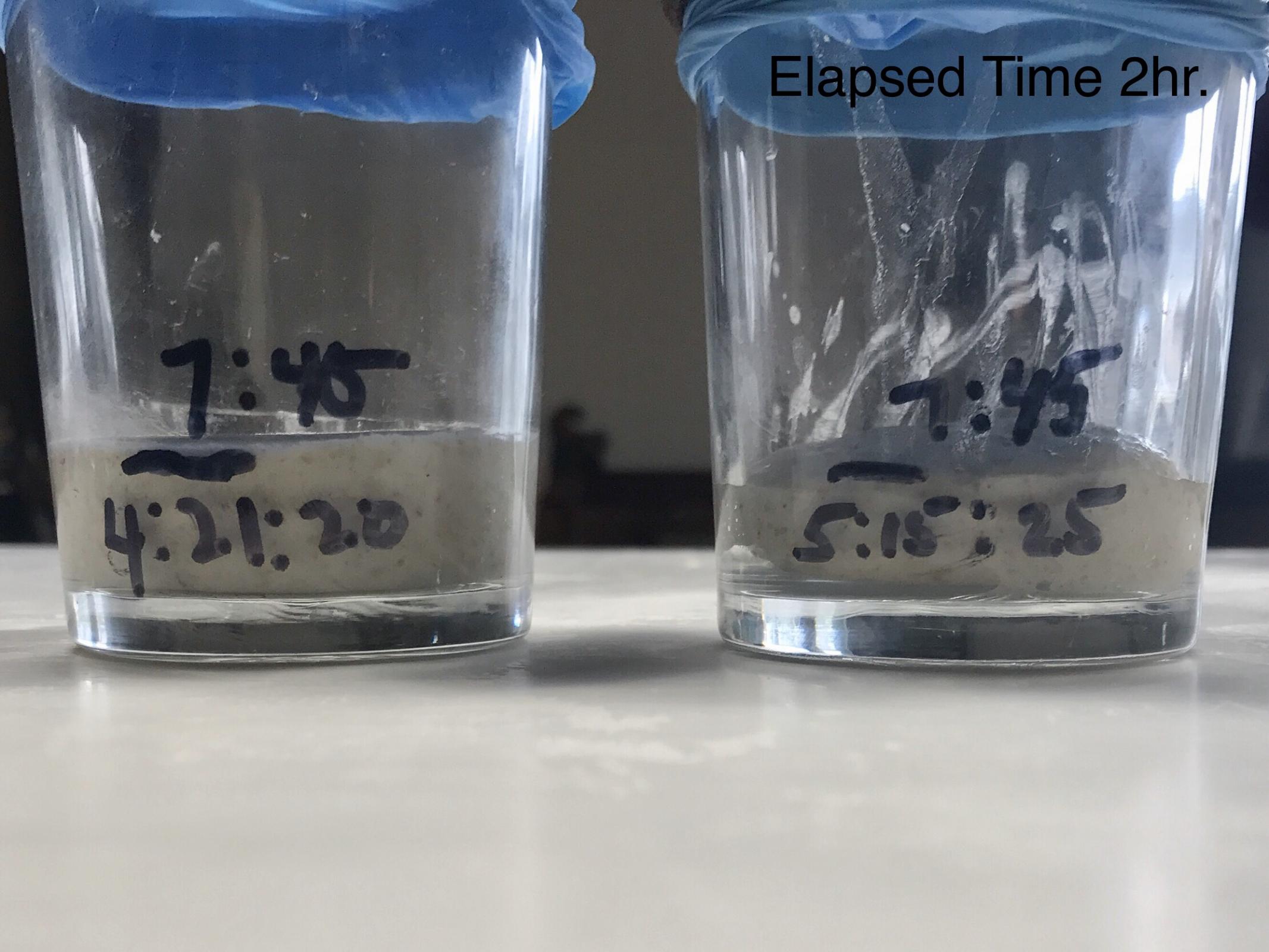I was inspired by Maurizio’s great article about starters and their maintenance. It is a must see.
This is a comparison of the activity and time to maturity of a dry starter versus a wet one.
In each image below, the starter on the left is 100% hydration and the one on the right is 60%. Both were built from the same starter. The original starter was 60% hydration, so the 100% starter got an extra gram of water to account for the dry starter and also to make both starters weigh 45 grams each. In each starter the mix ratio was 1 part starter to 5 parts flour. The flour feed consisted of 25% whole rye and 75% white flour. The starters fermented at 76F in a proofer. The comparison was quickly done, but others may find value in this post. It is obvious that wet starters mature much quicker than dry starters. The very same holds true with wet and dry doughs.
I would judge the 100% starter ready at 6 hr and the 60% at 8.





Suppose I wanted the 60% starter to mature in 12 hours. The starter could be reduced to 3.5 or 4 grams instead of 5 (raising the ratio of starter to flour) and/or reducing the temperature during fermentation. You could also use all white flour with no whole grains. You could use cold water when mixing the starter. There are a number of ways to reduce or increase the time to maturity. Once you become familiar with your starter you can control the time to maturity. You can time your levain to be ready to mix into your dough in 4 hours or 12, it’s up to you. Starters and levains are very accommodating once you learn them.
Keep in mind that these same principles used to control the fermentation of your starter can be used to control your levain and also the bread dough itself. We control the variables...
IMO, In both cases above, neither starter is setup for a 12 hr ferment. More tweaking is required.
Here are a list of tweaks attempting to facilitate a 12 hr fermentation cycle.
- lowered the starter to 4g. Water still 15 + 25 flour. Result - matured in ~10.5 hr.
- mixed 1:3:5, lowered the temp from 76F to 74. At 12 hr the starter was very close to maturity. It may have gone another 30 minutes or so. I expected a more open cell structure. See tweak #3.
- mixed 1:3:5 using the same 74F temp. This time I added 20% whole rye. I wanted to speed the starter just a bit and thought that the rye will cause the starter to “gas up” a little more. The starter receded at ~6:30, and it did gas up nicely.
Basically, the starter is now dialed in for a 12 hr feed cycle. I could opt to use 10 or 15% whole rye if I wanted to tweak further, ut this is close enough for most bakers.
The tweaks above can give you an idea of the thought process involved in tweaking your starter for your desired goal.
Tip - dry starter don’t collapse (recede) as easily as wet one ones. But this tip works for both. When the starter is nearing maturity, place a mark on the vessel and also the time. This way when you come back to inspect you’ll have a visual reference to better judge the growth or lack there of.
Danny
Danny, love your work ,as always, you do the test and then show us the result. Sometimes the result is expected, sometimes nit, but always interesting
I suppose the natural follow on question is "Does 100g of 60% hydration levain have more/same/less potency when added to your main dough compared to 100g of 100% hydration levain?".
Lance
Let me think about this...
I have it written on each glass.
100% 4:15:25
65%. 5:15:25
So the 100% was ~1 to 6.25
and the 65% was 1 to 5
So the results were actually more impressive. Even though the 100% had a smaller ration of starter to flour, the cycle to maturity was much smaller.
My purpose in mixing equal weights was to make visual comparison of the rise for each starter.
Thanks for the constructive observation.
Danny
Very good observation.